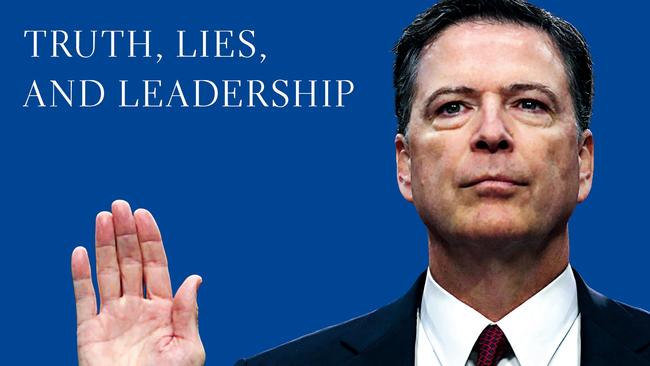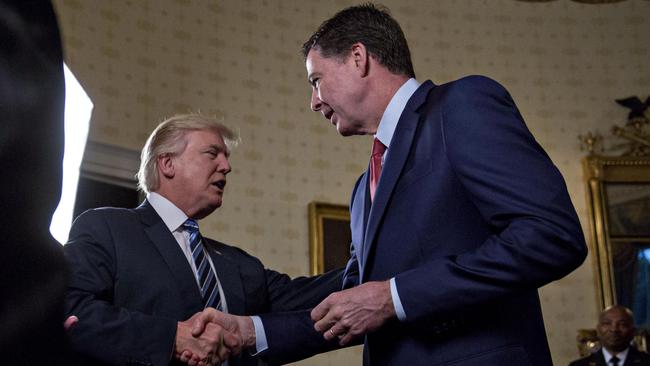A Higher Loyalty: Truth, Lies and Leadership, by James Comey
James Comey's book hasn’t taken down Donald Trump. But over time, it will resonate because his story is convincing and devastating.

Earlier this year, I reviewed Michael Wolff’s sensational, lacerating book on the Trump administration, Fire and Fury. Some claimed the book would bring down Donald Trump. It did not, of course. It has neither the weight nor depth to do anything other than achieve peripheral impact
Some critics of Trump hold similar aspirations for A Higher Loyalty, written by former FBI director James Comey. A glance at the fear and loathing on display at the recent White House Correspondents Dinner in Washington provides a window into the reservoir of ill will generated by this President.
But Comey’s book will have far greater impact over time than other recent commentaries. He weaves an insightful narrative on the basis of the fundamental and enduring strengths of the American republic, emerging in a future beyond Trump.
Comey constructs a crisply paced account in a meticulous manner, reflecting the roles of prosecutor and investigator that have characterised his professional life.
His service as deputy attorney-general in the George W. Bush administration and as FBI director under Barack Obama represents a realisation of his strong beliefs in the rule of law and equality before it.
And Comey sees the institutions of law enforcement as being critical to maintaining the public trust that guarantees the governance of the US.
Moreover, he intensely dislikes two kinds of people: liars and bullies. And so the stage is set for the FBI director’s troubled relationship with the 45th president.
The core of this book and the focus of public interest is Comey’s struggle to remain independent in the role and honest in his dealings with significant issues of American public life, from Hillary Clinton’s emails to Russian intrusions in the 2016 election. This interest is understandable but the early chapters of the book explain much about the man Trump openly despises.

It is worth noting that Comey’s clash with Trump was not the first time he had put his job on the line. Under the Bush administration, after 9/11, he faced down the White House and an enraged vice-president Dick Cheney over the National Security Agency’s domestic surveillance program, Stellar Wind, which he regarded as unlawful. In this confrontation, the crystallising moment of which unfolded at the hospital bedside of ailing attorney-general John Ashcroft, Comey had vital support from then FBI director Robert Mueller.
Comey’s early life saw him draw inspiration from his mother, from teachers and from a grocery store owner, Harry Howell, for whom he worked. Leadership emerged in a calm demeanour and good humour. Bullied at school in the New York suburbs, he developed a lifelong aversion to threats and thuggery and a rejection of dishonesty, even when he lied himself about playing basketball in college.
Comey recreates the tension of a meeting with Cheney where his legal advice on surveillance as acting attorney-general was defined as reckless and destructive:
The vice-president looked at me gravely and said that, as I could plainly see, the program was very important. In fact, he said, ‘Thousands of people are going to die because of what you are doing.’ The air in the room felt thin. It was obvious that the purpose of this meeting was to squeeze me, although nobody said that. To have the vice-president of the United States accuse me of recklessly producing another 9/11 — even seeming to suggest that I was doing it intentionally — was stunning.
A contempt for liars led to Comey’s decision to prosecute Martha Stewart for lying to federal investigators in New York over an insider trading scandal:
The Stewart experience reminded me that the justice system is an honor system. We really can’t always tell when people are lying or hiding documents, so when we are able to prove it, we simply must do so as a message to everyone. People must fear the consequences of lying in the justice system or the system can’t work.
His career in law enforcement has been heavily influenced by decisive women: his one-time boss in Richmond, Virginia, US attorney for the state Helen Fahey; and wife Patrice, who advised him during the Bush administration not to become “the torture guy” or justify the employment of “enhanced interrogation techniques” by the CIA.
Comey clearly likes and respects presidents George HW Bush and Obama. Not so the present incumbent of 1600 Pennsylvania Avenue. His time in New York as a federal prosecutor saw him cross paths with a diverse range of characters, from murderous members of the five New York crime families, such as Sammy “The Bull” Gravano, to the egotistical and self-promoting US attorney and later New York mayor Rudy Giuliani (now part of Trump’s legal team).
Comey specifically draws on his years prosecuting New York mobsters in describing his experience with the Trump administration. The FBI director comes under increasing pressure from the President on controversial investigations, such as the probe into Russia or into disgraced national security adviser Mike Flynn. He documents his meetings with Trump in memos and creates an evidentiary trail: one that may be of interest to special counsel Mueller.
Comey’s fall can be traced directly to his direct challenge to Trump over an answer to Bill O’Reilly on Fox News, where the President equated the US with Vladimir Putin’s Russia on the matter of state-sponsored killings. Trump becomes enraged; his face betrays his anger. Comey delivers a razor-sharp assessment:
As I found myself thrust into the Trump orbit, I once again was having flashbacks to my earlier career as a prosecutor against the Mob. The silent circle of assent. The boss in complete control. The loyalty oaths. The us-versus-them world view.
The lying about all things, large and small, in service to some code of loyalty that put the organisation above morality and above the truth.
Since his sacking, which he learned about on television, Comey has been doing the talk show circuit to promote his book. Stephen Colbert offered him the chance to respond to Trump’s evaluation of him as a “slime ball”. Comey grinned and said he was like a break-up Trump could not get over.
However, Trump has created a critic whose judgments will resonate because his story is told in a way that is convincing in its understated humility and devastating in its revelations.
Stephen Loosley is a visiting fellow at the United States Studies Centre at the University of Sydney.
A Higher Loyalty: Truth, Lies and Leadership
By James Comey
Macmillan, 290pp, $32.99


